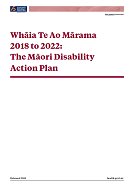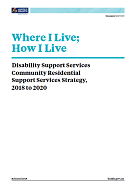Source: New Zealand Ministry of Health – Press Release/Statement:
Headline: Whāia Te Ao Mārama 2018 to 2022: The Māori Disability Action Plan

Summary
Whāia Te Ao Mārama is a culturally anchored approach to supporting Māori with disabilities (tāngata whaikaha) and their whānau because Māori are more likely to be disabled than the general population. Most tāngata whaikaha identify as Māori first, so access to Te Ao Māori (the Māori world) is important to them.
The previous version of the plan, Whāia Te Ao Mārama 2012 to 2017, led to changes that improved outcomes for tāngata whaikaha and their whānau. While much has been achieved between 2012 and 2017, improving outcomes for tāngata whaikaha and their whānau remains an important priority.
Whāia Te Ao Mārama:
- supports tāngata whaikaha to achieve their aspirations and to reduce the barriers they face
- builds on the foundation, vision and outcomes of Whāia Te Ao Mārama 2012 to 2017
- outlines progress and changes since 2012
- documents goals and actions for 2018 to 2022.
- was developed in partnership with Māori disability stakeholders and with the oversight and endorsement of Te Ao Mārama: the Māori Disability Advisory Group.
Whāia Te Ao Mārama recognises that everyone must work together to achieve the vision – tāngata whaikaha pursue a good life with support. It outlines what the Ministry is committing to do from 2018 to 2022 and provides examples of actions tāngata whaikaha, whānau, health and disability providers, iwi and other organisations can take.
—
